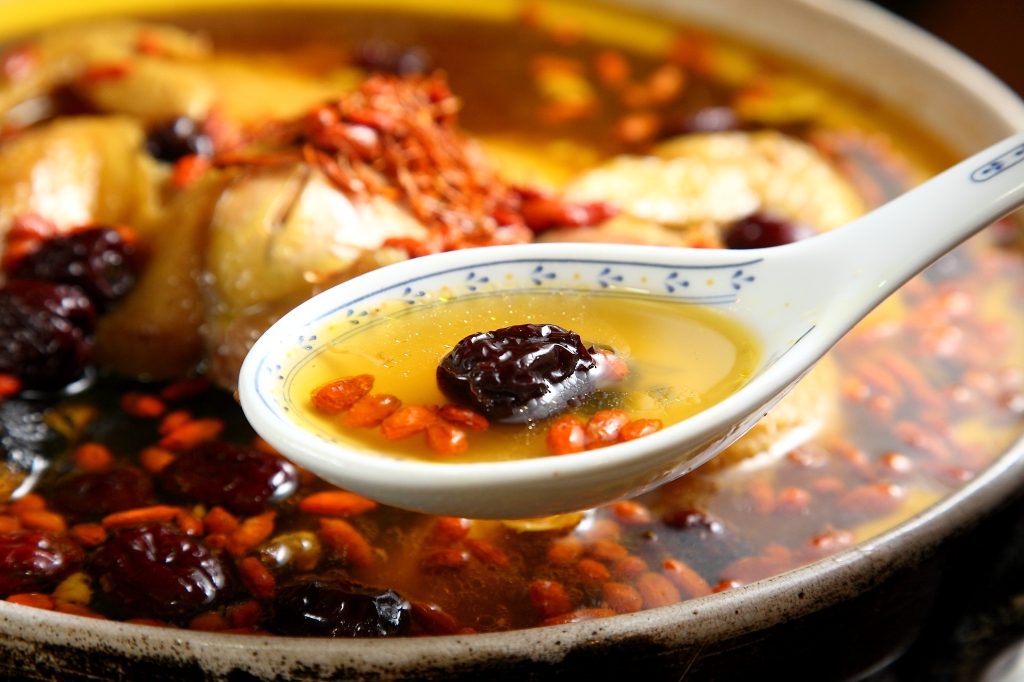
The benefits of bone broth are now well known, but you can kick it up a notch by adding these Chinese Herbs during the last hour of cooking. Consider it as extra insurance for your immune system. I have broken down the medicinal benefits of each herb in this soup which I have found healing for myself and my family. You can learn more about the energetics of food in Indian Summer: Nourishing the Earth Element and Wisdom of the Five Flavors course at Five Element Academy. If you don’t want to buy the herbs individually, I recommend Plum Dragon’s Chicken Soup Herb Pack. You will find the recipe on their website: Plum Dragon Herbs.
The Herbs:
Astragalus Root (Huang Qi) – Helps to prevent and treat corona viruses (common cold & flu) and upper respiratory infections. Its herbal actions include: immunomodulator, anti-inflammatory, antibacterial, antioxidant, cardioprotective, hepatoprotective, and adaptogenic. Astragalus is a nervous system tonic, immune tonic, and Spleen qi tonic (diabetes). Considered a foundational herb in TCM, Astragalus, in addition to being a deep immune system activator, also strengthens the lung qi and the surface immune system, which is the first line of defense against pernicious influences. It also appears to enhance nonspecific and specific immunity. Astragalus is a beneficial herb for anyone who might be immune-compromised. Learn more by reading my Wisdom of the Plant Devas Blog post, Astragalus for Myocarditis, Long Covid, & Immune Support
Codonopsis Root (Dang shen) – A superb Qi tonic used to invigorate the Spleen and Lung and treat yin deficiency. It is an excellent Blood tonic and a major immune system tonic. Codonopsis has powerful strengthening effects, especially on the digestive, respiratory and immune systems and has been used since antiquity to build strong, healthy children.
Solomon’s Seal (Yu Zhu) – The key actions of Solomon’s Seal are demulcent, expectorant, sedative, and tonic. It has an affinity for the Lung and Stomach, can help with a dry cough and sore throat, and is most prized as a yin tonic. Yin tonics work by restoring the Water Element (Kidney), which cools the Liver (Wood Element). Tendons and ligaments are the body part that correspond with the Wood Element, and this is why Solomon’s Seal is used to help heal injured tendons, and restore proper tension to ligaments. It does this by its ability to nourish yin, moisten dryness, and to nourish and moisten sinews. Solomon’s Seal also quells wind, relieving pain and spasms due to wind generated fluid deficiency. Learn more by reading my Wisdom of the Plant Devas Blog post, Solomon’s Seal: Adapting to Stress & Achieving Flexibility in Times of Change
Angelica Sinensis (Dang Gui) – A superior blood tonic that supports healthy blood circulation, especially in the abdomen and pelvic basin. It also has analgesic and mild sedative (calming, relaxing) actions.
Chinese Yam (Shan Yao) – Energetically sweet it strengthens the Spleen and Stomach, and nourishes the Earth Element. Learn more in Indian Summer: Nourishing the Earth Element
Goji Berries (Gou Qi Zi) – Also known as Wolfberries, they are nutritious, improve immune function, and increases energy.
Dried Figs (Wu Hua Guo) – An energetically neutral food (yin & yang balanced) and known to moisten the lungs and relieve coughs. Energetically sweet they invigorate the Spleen.
Dried Red Dates (Hong Zao) – Balance qi and nourish the Blood. Improves insomnia and protects the Liver.
Resources:
Chinese Soup Pot: Delicious Soups For Optimal Health
Thea Summer Deer’s Blog: The Carnage of Waste
Note: I review products independently and only recommend ones that I have used personally. As a Plum Dragon affiliate I may earn a commission from qualifying purchases.
Pingback: Astragalus for Myocarditis, Long COVID, & Immune Support | Wisdom of the Plant Devas
Pingback: Solomon’s Seal: Adapting to Stress & Achieving Flexibility in Times of Change | Wisdom of the Plant Devas